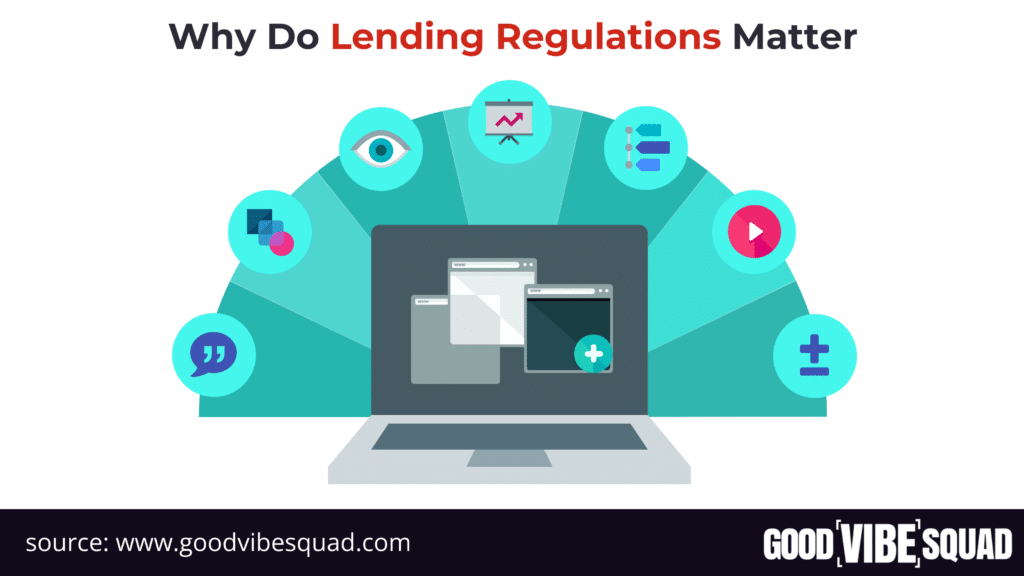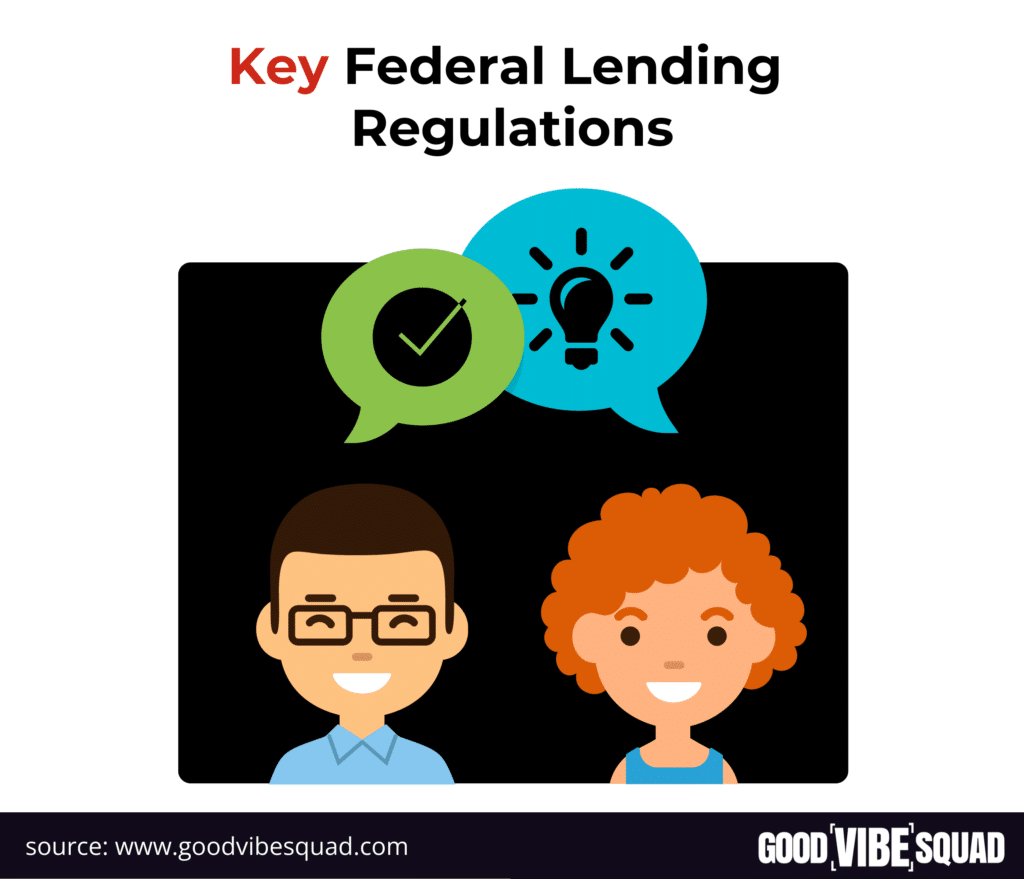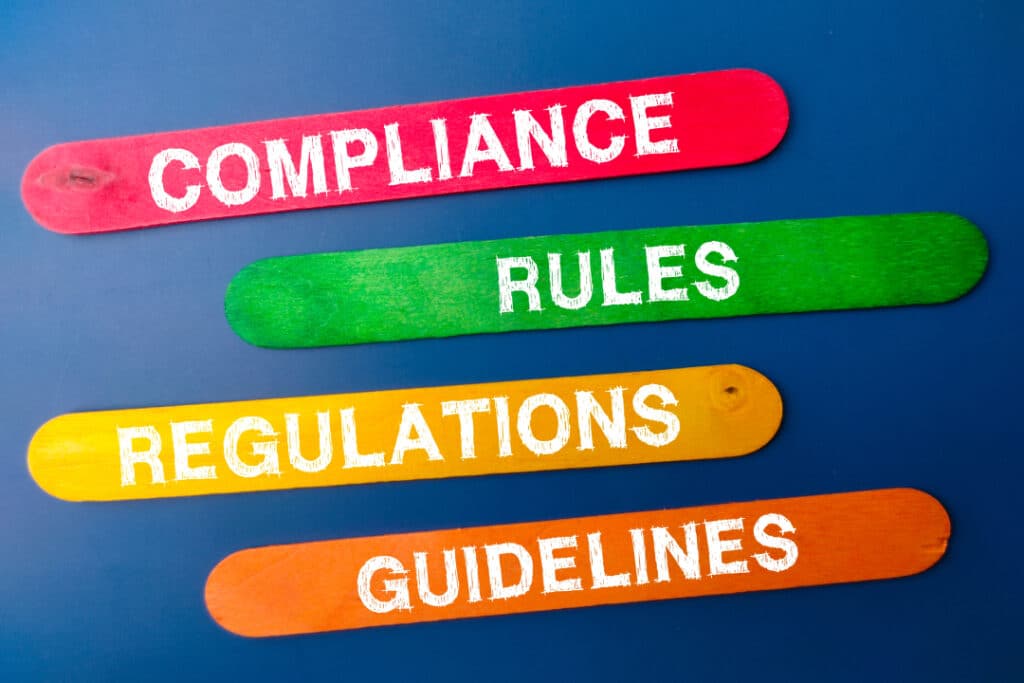Keeping up with constantly evolving regulations can be challenging as a lending professional. Adhering to the necessary protocols facilitates lending processes and advances one’s career. Fortunately, this comprehensive guide is the ultimate resource for you. It has expert knowledge of regulations, top-notch strategies, and enforcement procedures. By reading this guide, you will understand lending rules and enhance your expertise in the field. So take a break, grab a coffee, and embark on a thrilling journey into lending with us.
Key Takeaways
- Core federal lending regulations, such as TILA, RESPA, ECOA, and HMDA, protect consumers by requiring transparency, non-discrimination, and anti-kickback.
- Noncompliance with lending rules severely impacts customer trust and prompts strict regulatory penalties, making adherence imperative.
- Proactively implementing compliant processes, closely documenting all application details, and regularly continuing compliance education enable sustainable adherence.
Get Our Billion Dollar Mortgage Playbook
Get the proven strategies that helped close Billions of dollars in funded deals!

Why Do Lending Regulations Matter
At their core, lending regulations protect consumers, promote fairness and transparency, and maintain integrity across the lending industry. By adhering to these rules in all your interactions and transactions, you contribute to ethical practices that foster trust on an individual and systemic level.
Conversely, noncompliance can undermine client relationships and public faith, exposing you and your institution to legal consequences or reputation damage. As the public face of lending for many clients, loan officers have an amplified responsibility to serve as stewards of regulatory principles through compliant business operations.

Key Federal Lending Regulations
- Truth in Lending Act (TILA) – Governs disclosures on costs/terms of consumer credit to inform comparison shopping.
- Real Estate Settlement Procedures Act (RESPA) – The law promotes transparency in real estate deals by requiring disclosures of relevant information and prohibits kickbacks.
- Home Mortgage Disclosure Act (HMDA) – Requires collecting/reporting mortgage data to detect discriminatory lending patterns.
- Equal Credit Opportunity Act (ECOA) – Prohibits credit discrimination against protected classes in all aspects of lending.

Mastering Top Regulations and Responsibilities
Let’s explore major federal regulations central to a loan officer’s responsibilities and tips to ensure compliance.
Truth in Lending Act (TILA) – Your Disclosures Guide
The Truth in Lending Act aims to empower consumers with clear information to make the best borrowing decisions. As a loan officer, core requirements include:
- Providing accurate annual percentage rates (APR) reflecting total loan costs
- Itemizing all finance charges/fees associated with the loan
- Disclosing total repayment amounts over the entire loan term
- Detailing payment schedules, including quantities and due dates
- Explaining the right of rescission allowing borrowers to cancel certain mortgages
Strategies for Success:
Always double-check disclosure accuracy before sharing with applicants. If applicants need clarification on complex calculations like APRs, provide it. Keep meticulous documentation showing proof of disclosure.
Real Estate Settlement Procedures Act (RESPA) – Your Anti-Kickback Guide
The Real Estate Settlement Procedures Act prohibits sly practices that could artificially inflate closing costs for personal gain. Primary provisions require loan officers to:
- Provide Good Faith estimates of settlement fees within 3 days of loan applications
- Refrain from payments for referrals or kickbacks of any kind
- Oversee proper management of required escrow accounts
- Notify borrowers if loans transfer to new services, including updated payment details
Strategies for Success:
Avoid any relationships implying you receive incentives for promoting certain title companies, appraisers, etc. Never accept payments unrelated to services provided. Ensure escrow accounts only collect permitted payments and make disbursements on time.
Home Mortgage Disclosure Act (HMDA) – Your Data Collection Role
The Home Mortgage Disclosure Act compels lenders to share mortgage data so regulators can monitor the market. As a loan officer, you contribute by:
- I diligently collect mandated application details like borrower info, property addresses, etc.
- Promptly submitting compiled data to your HMDA compliance team
- Staying updated on reporting requirements
- Collaborating with compliance staff on questions
Strategies for Success:
Double-check that all entries on forms match supporting documents to ensure flawless reporting. Learn proper data collection procedures through company training.
Equal Credit Opportunity Act (ECOA) – Your Fair Lending Guide
The Equal Credit Opportunity Act prohibits discriminatory lending practices. Critical requirements include:
- It is essential to treat all applicants equally, regardless of their race, gender identity, marital status, and other personal characteristics. It is crucial to avoid discrimination based on these factors during selection.
- Basing decisions strictly on financial qualifications, not personal attributes
- Communicating the next steps clearly so applicants understand the outcomes
Strategies for Success:
Provide every applicant the same exceptional service, resources, and options tailored to their needs. Seek compliance training on the latest non-discrimination standards.

Compliance
Navigating lending regulations requires diligent effort and awareness across mortgage institutions. Thus, open dialogue with key parties facilitates organized, company-wide adherence.
- Manager Oversight – Review standards/procedures and provide regulatory procedure resources
- Compliance Team – Deliver the latest rule updates and offer new training on fair lending practices
- Legal Counsel – Consult on complex regulatory applicability questions
By combining your frontline precautions with collaborative reinforcement across departments, your institution can implement reliable checks and balances to catch potential issues early while building a culture of accountability at scale.

Avoiding Noncompliance Landmines
Despite best intentions, compliance missteps occur frequently for rushed loan officers unaware of common pitfalls. Protect yourself by sidestepping these traps:
- Rushing Disclosures: Providing accurate or precise cost estimates from carelessness undermines your duty of transparency. Always double-check your math.
- Concealing/Fabricating Figures: Dishonesty sabotages integrity. If numbers don’t work, revisit options honestly; don’t cover up obstacles with false data.
- Downplaying Oversights: Overlooking long-term internal process gaps or warning signs threatens consumers and institutions. Highlight concerns to superiors right away.
Yield spread premium compensation and incentives loan modifications in your favor over clients erodes public trust. When faced with flexibility, proactively evaluate whether recommendations provide optimal outcomes for clients first and foremost.

What Happens If I Violate Regulations
Maintaining compliance deserves top priority since breaches prompt forceful regulatory responses that jeopardize livelihoods and bottom lines, including:
- Fines or penalties from regulators like the CFPB
- Legal action from wronged applicants
- Permanent revocation of professional licenses
- Restricted business activities limiting profit potential
- Collapse of customer confidence and sales

Getting It Right From Day One
Though regulations seem ceaseless, a few best practices make consistency completely manageable:
- Standardize Compliant Processes: Create checklists covering key regulations and required compliance steps to reference for each new loan.
- Document Diligently: Always keep meticulous records of all applicant interactions and loan details to have proof of regulatory adherence.
- Continue Learning: Allot time monthly to take CPE courses on the latest rule changes and refresh knowledge of ethical practices.
The regulatory environment will only grow more complex, so dedicating yourself now to cementing a foundational command of lending compliance equips you to adapt lending operations quickly to future laws.
Unveiling the Role of Loan Officers in Navigating the Loans and Ensuring Ethical Financial Practices
Loan officers are the superheroes of the financial world, trusted by their clients to guide them through the maze of loans and lending options. They hold a vital role in upholding consumer protection principles and ensuring that ethical practices are maintained with transparency and fairness. The loan officers must master the key regulations to avoid disastrous noncompliance penalties and to be the guardians of financial empowerment for their clients. Dedication to lifelong learning and unwavering integrity are essential to building a distinguished and trustworthy reputation as the customers’ guardian of the financial world. So, let the loan officers be the superhero who helps their clients achieve their financial dreams!
Frequently Asked Questions
Q: What are the most severe lending compliance violations?
A: The most damaging compliance violations undermine core regulatory principles like transparency or prohibition of discrimination. This includes falsifying loan cost disclosures, steering clients toward unfavorable loan options for personal financial gain, or allocating loan access inequitably across applicant demographics.
Q: Who establishes federal lending regulations?
A: Key lending oversight bodies, such as the Consumer Financial Protection Bureau, Federal Reserve, and Department of Housing and Urban Development, create regulations containing legal compliance obligations for loan officers and institutions. State agencies also enact additional statewide lending rules.
Q: How often do lending rules change?
A: Though extensive regulations exist, legislative bodies frequently introduce additional lending rules or update existing laws to address emerging issues. This produces regulatory revisions across months and years, making ongoing continuing education crucial for loan officers.
Q: What happens if I report a lending compliance concern?
A: Responsibly reporting suspected compliance deficiencies reflects ethical awareness and allows institutions to before forced regulatory intervention. Most organizations prohibit retaliation for good-faith reporting.
Q: Where can I find official resources on current lending rules?
A: Helpful regulatory resources include federal agencies’ websites like consumerfinance.gov, industry association guidance from groups like the MBA, training centers at higher education institutions, and reputable publications covering the latest rulings.
Upgrade Your Mortgage Business with GoodVibeSquad
Are you ready to take your mortgage business to the next level? Let GoodVibeSquad help! Our expert mortgage marketing team can help you reach more clients and close deals. We provide comprehensive services covering everything from managing your social media accounts to email marketing campaigns. Don’t wait longer to elevate your business – contact us today to get started!







